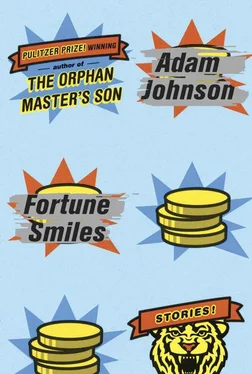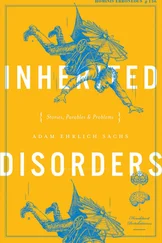I turn away. On my desk is the wooden “lost and found” box. Its label reads only: “Objects confiscated from inmates.” There are some pieces of jewelry, a rubber ball, a transistor radio, a miniature Bible and so on. I find a tattered copy of 1984 . I open the book and read a little. Of course it is fiction, but the author gets a few things right — the control, the scrutiny, the feeling that nothing can be spontaneous, that the slightest move carries consequences for your future. It evokes a feeling I haven’t experienced in a long time, a sense that, even though you have a great job and house, there is no safe place to turn.
The curator closes the door, and here is the portrait: Brigitte and Hans on the Augustusbrücke in Dresden, the two of us tossing bread to swans on the Elbe. I hung it here so it couldn’t be seen when I had prison business, so that it was only when the door was closed, when I was alone, that I could spend time with the image of her. It’s the kind of picture a man hangs so he can be reminded that, no matter what happens in the cells around him, this is the woman who loves him, who awaits him, whom, after Günter finally arrives with his angry dogs, he will soon embrace.
I reach to take the photograph from the wall.
The curator stops me. “I’m sorry,” he says, and clasps his hands together. “This is now the property of the citizens of Germany.”
—
All afternoon, I walk Prinz. He doesn’t sniff from bush to bush like normal. He smells doorways and car tires and each seat in the bus shelter. I can tell he is searching for Gitte. Everywhere he sniffs for her, but there is no sign.
The wind is from the northwest. I turn up my collar. On the opposite side of the street, a man in an overcoat also strolls slowly along, and I have the illusion that he is pacing me. I let my mind drift to the churches where, at this time of day, Gitte meets with her fellow alkoholikers . She is probably working out her troubled history — surviving the bombing of Magdeburg, how her family lived like mice in the rubble as they faced the tanks, the typhus, the nuns and then the Soviets. Long ago, after we first met, she told a story of how her father, following the January bombing, went out with a wheelbarrow in search of something unburned — clothes or food or wood for a fire. He returned before dawn with an unexploded bomb that he wheeled into the abandoned depository where they’d sought shelter. She recalled in mythical terms how her father gathered the family around to watch him challenge the bomb to a fight.
Many times I tried to get her to explain the meaning of this. The topic was a delicate one, and I had to be careful — the sickness was to take her mother, a Soviet work camp her father and the orphanages her sisters. Hers was that kind of tale. Of the night her father fought the bomb, she would say only that it was a happy memory, that she didn’t remember being cold or hungry, that they were all together and that her father won the fight.
“He fought the bomb how?” I once asked her.
“He attacked it with a brick,” she answered.
I never suffered in the war the way Gitte did. After Rostock was bombed and I was injured, my mother fled to the safety of Schwerin, near where my father was stationed. Of the bomb that set this in motion, I remember little. I was five years old, standing on the street next to a team of fire horses, their coats steaming in the cold after they’d raced through the city center. I was struck by a wall of light. All at once there was wind and grit, and because the bomb had landed in a fabrication shop, in all directions went a hail of iron filings. The metal was like lightning — I could feel the electricity in each sliver.
When Gitte first saw me shirtless, she reached to touch these pocked scars, her eyes flashing to mine with a certain recognition, like she had finally found someone who’d been through what she’d been through, who could understand, without her having to say the words, the events that had formed her. And because I was already in love with her, because I’d already forgotten who I was without her, I allowed her to believe this lie. Over the years, however, when she needed someone who had these powers of understanding, I proved incapable.
Prinz and I pass an after-work local on Bahnhofstrasse, where couples share plates of Buletten and lift cups of Federweisser, cloudy as sea glass. Here Prinz stops. But he doesn’t eye the food. He stares across the street to the man in the overcoat.
Across the street, the man in the overcoat stops.
Facing us, he touches his nose, which is a Stasi hand signal for halt surveillance.
He crosses to us, and when he nears, I see it is Grünwald, and he is smiling. He still sports a Stasi colonel’s mustache, but his teeth, I notice, have been bleached.
“There you are, Hans. Have you been hiding from me?”
I see the newspaper under his arm. “How’s the job hunt?”
“One no longer uses the classifieds,” he informs me. “It’s all on the computer now, yet this new system conspires to keep us older people out of the market. Isn’t this new country supposed to be fair? Isn’t it supposed to value a person’s merits? Yet all we encounter is discrimination. For excellence in interrogation, Mielke personally pinned the Black Shield to my chest. But will anyone employ me? The Gewerkschaft der Polizei has three hundred interrogation specialists, but will they even look at my application?”
I ask, “Are you hitting me up for a letter of recommendation?”
Grünwald taps me with the newspaper. It’s as much affection as he’s capable of.
“Hans trying to be funny — this is a bad sign,” he says. “How are you holding up? Have you heard from her?”
“Soon, I believe. It has only been four months. She just needs to get herself cleaned up. There are some problems for her to work through. I only wish I knew where she was, how she’s spending her days.”
“You didn’t Facebook her, did you?”
“I don’t know how.”
“This is for the best, trust me,” he says. “You know, I have five thousand friends on this website, the maximum allowable. Can you guess our current topic of conversation, can you guess our new hero?”
“I suppose you mean the video?”
“Yes, it’s you, Hans! Our new leading man.”
Before I can admit that I was unable to locate the video on the Internet, he plays it for me on his phone. The video is short, and yes, the waving of the dog-shit bag produces an unfortunate effect. The interesting thing is that the girl has managed to write over the video with arrows and red lettering. For instance, an arrow points to my forehead, and the caption says, “Throbbing Vein.” Others read “Crazy Eyes” and “Spittle.” When I make my most salient point, the viewer cannot help but be drawn toward red wavy lines emanating from my mouth and the caption “Old Man Breath.”
I look down at Prinz. He is looking up at me.
“Do not be dispirited, Hans,” Grünwald says. “The video is a good thing. You are the only one telling the truth. All these former inmates make me sick. They have turned themselves into little celebrities, writing books, appearing on chatty talk shows, and believe me, they know what the TV people want to hear — horrible stories of torture and tales of secret cemeteries. I heard one say we had turned him into a living puppet. A puppet? What were we, then — Guantánamo Bay, a North Korean gulag?”
Two women are heading our way, looking at a map. Grünwald immediately engages them. His wife, like most Stasi wives, left him right after the Wall came down, and I admit I’d long felt superior that my marriage had survived.
“I’m afraid we’re lost,” one woman says. We can hear she is Austrian.
Читать дальше












